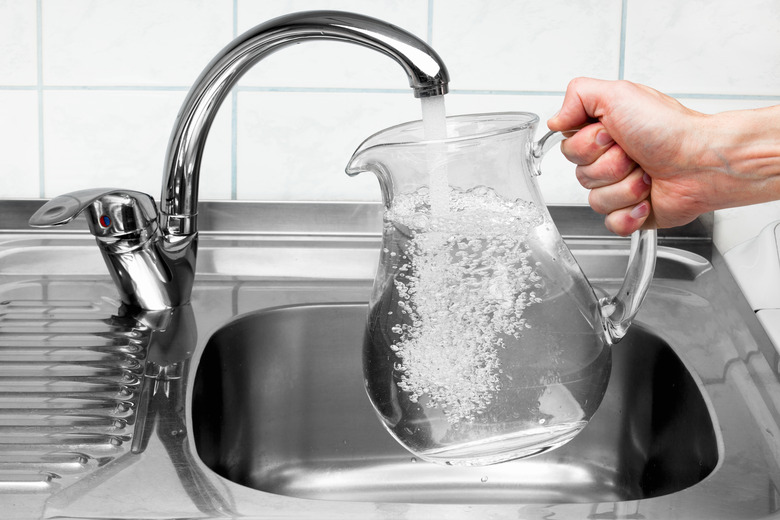For How Long Is Tap Water Safe In A Refrigerator?
Theoretically, tap water stored in a clean container and then refrigerated should last forever. However, just because you can drink old water doesn't mean you'll want to. Over time, small air bubbles leak out of stored water and leave behind an unappealing taste. To avoid this issue, discard your stored tap water supplies and replace them every six months so you'll always have fresh water if your local water provider's supply is contaminated or otherwise unavailable.
Tip
Store tap, filtered, or emergency water supplies, in or out of the refrigerator, for no more than six months.
Preparing for Storage
When storing tap water, it's important to use the proper container. Glass, enameled metal, and fiberglass containers are all well-suited to the task. You can also use plastic containers, but make sure they're of food-grade quality. These containers are often labeled "HDPE 2."
Clean the bottles thoroughly before filling them with water and make sure they're in good condition. Avoid the temptation to recycle old milk jugs or water bottles. You're not likely to get them clean enough and these thin plastics degrade quickly, potentially leaking or allowing bacteria to enter your water stores. Once your containers are ready, you'll need to prepare your water.
In most areas, tap water is safe and needs no special attention. If your water needs to be filtered or if you simply prefer it that way, filter the water before filling your bottles. Tap water should also contain at least 2 to 4 parts per million (ppm) of chlorine to kill bacteria. If your water supplier doesn't add chlorine (most do), you'll need to do so yourself.
Storing Filtered Water
Once you've filled your water bottles, you'll need to find a safe place to store them. Storing water in the refrigerator is acceptable and will keep cold water at the ready. Refrigeration also helps reduce the risk of bacterial growth in the water. Refrigeration isn't strictly necessary, however.
You can store your water in any cool, dark place. Add sturdy shelving to basements, garages, crawl spaces, and cellars — all serve as good places to store water. If you're storing a large amount of water in case of a disruption in your water supply, remember to store your water in more than one place. Doing so will leave you a backup plan if something destroys or contaminates some of your stored water.
Stored Water's Longevity
While it's true that properly stored water should never expire, even filtered water tastes bad after sitting long enough. Energy.gov recommends refreshing your emergency water supply every six months. When freshening your water supply, remember that you'll need at least 1 gallon of water per person per day.
If you're storing water in the refrigerator for everyday drinking, you'll want to change it more often to keep it tasting its best. In this case, replace any remaining water once a month. You can also freeze water, and doing so prevents any plastic chemicals from leaching into it.
Once you've opened a container of stored water, try to use it within two to three days. It will last a bit longer in the refrigerator and you can stretch its shelf life there for about three to five days. After that, the water will remain safe to drink but may not taste as good.
When in Doubt, Throw It Out
Unless you're in a survival situation like an earthquake, flood, or zombie apocalypse and have no choice, avoid drinking water you're unsure about. Don't drink stored tap water if it appears cloudy or has particles floating in it. It's also best to avoid water that's been exposed to sunlight and has begun to grow algae.
Even if the water looks good, discard it if it smells odd. If you still aren't sure, take a small taste. If you have any doubts, discard the water rather than consuming it. When water is in short supply and discarding it is unwise, make sure to boil or otherwise purify suspicious water before drinking it.
